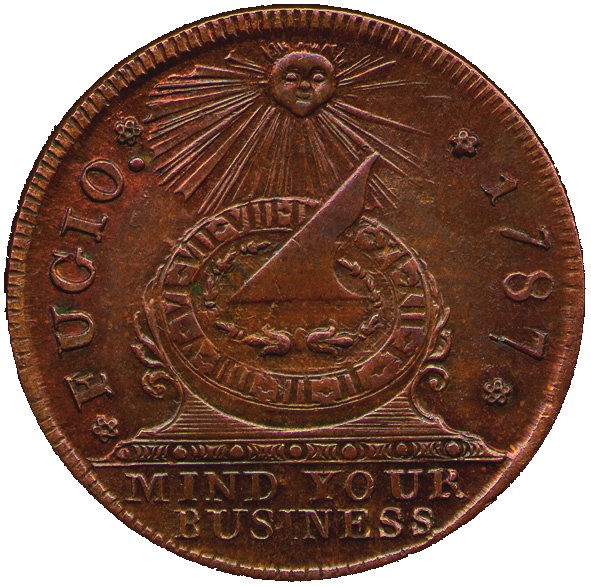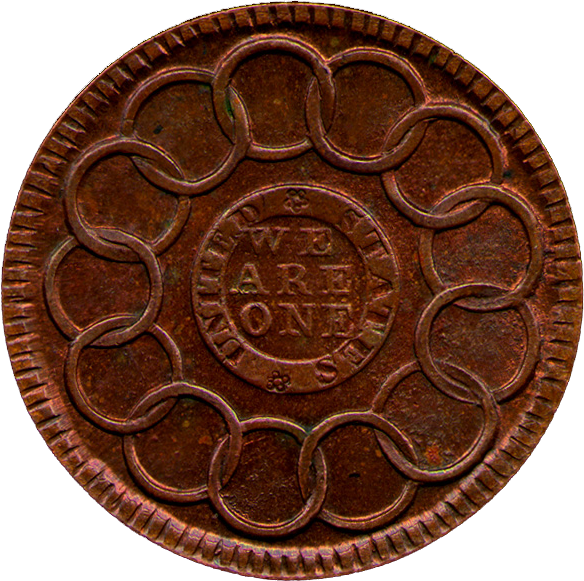A Penny Earned
Pictured below is the Fugio cent, the first coin ever minted by the United States pursuant to the Constitution. It is widely considered to be the first official coin of the U.S. and is a highly sought after collectible today. And as one can clearly make out from the image, the coin doesn’t say “In God We Trust” or “E Pluribus Unum” on its front face. Instead, it reads — strikingly — “Mind Your Business.”

Was the first American coin the government’s way to demand that we stop being so nosy? Probably not — because it was designed by Benjamin Franklin, who most likely couldn’t pass up the opportunity to make a complicated pun.
On December 28, 1735, Franklin — under the pseudonym “Richard Saunders” — published the first issue of Poor Richard’s Almanack. The annual, which he’d publish for the next 25 years, is probably best known for its aphorisms — creatively-phrased words of wisdom from the man who now adorns the $100 bill. The 1735 edition, for example, included a snarky observation about privacy: “Three may keep a secret, if two of them are dead.” It also contained perhaps his most famous piece of rhyming advice: “Early to bed and early to rise, makes a man healthy, wealthy and wise.” And in another issue of the Almanack, he famously didn’t say “a penny saved is a penny earned.” (Yes, he didn’t say that — the actual quote is “A penny saved is twopence dear.”)
These quips give us an insight into Franklin’s values. We knew that he believed that hard work and economizing one’s time were keys to a successful business and that saving was a key to lifelong wealth. Further, we know that Franklin wasn’t one to butt out of other’s affairs — he doled out unsolicited advice constantly. Taken together, it’s unlikely that the primary meaning of the coin was “mind your own business,” like we say today
The coin itself suggests similarly. On the same side as “Mind Your Business” is the word “Fugio,” latin for “I fly” or “I flee.” According to Wikipedia, many historians believe that this, combined with the picture of the sun above a sundial, form a rebus — the sun/sundial signifies time, and with “fugio,” means “time flies.” And “time flies, mind your business” seems like sage advice to those operating a company.

The back, seen above, gives another reason to believe that the “mind your business” quip isn’t instructing recipients to keep to themselves. There are thirteen interlocking links forming one chain, signifying the thirteen original American colonies, and the word “We Are One.” It’d be curious, at best, to suggest that people should look out for themselves given this clear call to unity. Franklin was almost certainly telling business owners and the like to keep an eye on their stores and their books.
But it wouldn’t be beyond Franklin to use this opportunity to intentionally serve up a (non-risque) double entendre. The phrase “mind your business” likely is a precursor to a more modern phrase advising us to stay out of others’ affairs. Google has a tool called the Ngram Viewer which graphs mentions of certain phrases in books based on when those books were published. If you look at the graph of “mind your business” versus “mind your own business” (click here to see it), the former is relatively more popular until the late 1700s — when the coin above was minted — and by the 1830s, “mind your own business” became dramatically more common. There’s some reason to believe that the phrase “mind your business” meant then what “mind your own business” does today, depending on the context.
Unsurprisingly, the most likely conclusion, as Wikipedia further suggests, is that Ben Franklin was being a bit cheeky — and using the country’s first coin to do so.
Bonus fact: Early to bed, early to rise, makes a — wait. It really doesn’t guarantee much of anything. There are plenty of examples of people who go to bed early and wake up early, yet are ill, poor, and hardly wise. So why does Franklin’s quote ring true? Perhaps, because it rhymes. According to a study published in 2000, “rhyme, like repetition, affords statements an enhancement in processing fluency that can be misattributed to heightened conviction about their truthfulness.” Or in other words, if it doesn’t fit, you must acquit.
From the Archives: Almighty Currency: When and why American coins began to read “In God We Trust.”
Related: A replica Fugio cent. You can also buy a pack of 25 such replicas, but it’ll run well over $250, which seems crazy for fake money.
